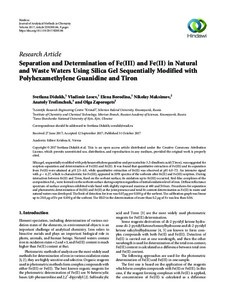Separation and Determination of Fe(III) and Fe(II) in Natural and Waste Waters Using Silica Gel Sequentially Modified with Polyhexamethylene Guanidine and Tiron
Скачать файл:
DOI:
10.1155/2017/8208146URI (для ссылок/цитирований):
https://www.hindawi.com/journals/jamc/2017/8208146/https://elib.sfu-kras.ru/handle/2311/110987
Автор:
Svetlana, Didukh
Vladimir, Losev
Elena, Borodina
Nikolay, Maksimov
Anatoly, Trofimchuk
Olga, Zaporogets
Коллективный автор:
Институт цветных металлов и материаловедения
Кафедра композиционных материалов и физико-химии металлургических процессов
Кафедра физической и неорганической химии
Дата:
2017-10Журнал:
Journal of Analytical Methods in ChemistryКвартиль журнала в Scopus:
Q2Квартиль журнала в Web of Science:
Q3Библиографическое описание:
Svetlana, Didukh. Separation and Determination of Fe(III) and Fe(II) in Natural and Waste Waters Using Silica Gel Sequentially Modified with Polyhexamethylene Guanidine and Tiron [Текст] / Didukh Svetlana, Losev Vladimir, Borodina Elena, Maksimov Nikolay, Trofimchuk Anatoly, Zaporogets Olga // Journal of Analytical Methods in Chemistry. — 2017.Аннотация:
Silica gel, sequentially modified with polyhexamethylene guanidine and pyrocatechin-3,5-disulfonic acid (Tiron), was suggested for sorption separation and determination of Fe(III) and Fe(II). It was found that quantitative extraction of Fe(III) and its separation from Fe(II) were attained at pH 2.5–4.0, while quantitative extraction of Fe(II) was observed at pH 6.0–7.5. An intensive signal with g=4.27, which is characteristic for Fe(III), appeared in EPR spectra of the sorbents after Fe(II) and Fe(III) sorption. During interaction between Fe(II) and Tiron, fixed on the sorbent surface, its oxidation up to Fe(III) occurred. Red-lilac complexes of the composition FeL3 were formed on the sorbent surface during sorption regardless of initial oxidation level of iron. Diffuse reflectance spectrum of surface complexes exhibited wide band with slightly expressed maxima at 480 and 510 nm. Procedures for separation and photometric determination of Fe(III) and Fe(II) at the joint presence and total Fe content determination as Fe(II) in waste and natural waters was developed. The limit of detection for iron was 0.05 μg per 0.100 g of the sorbent. The calibration graph was linear up to 20.0 μg of Fe per 0.100 g of the sorbent. The RSD in the determination of more than 0.2 μg of Fe was less than 0.06.

